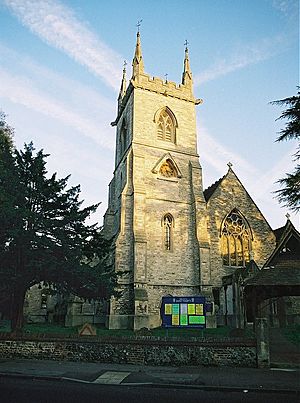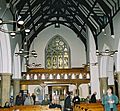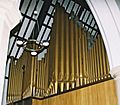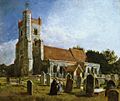St Mary's Church, Ewell facts for kids
Quick facts for kids St Mary's Church, Ewell |
|
|---|---|

The Church of Saint Mary the Virgin, Ewell,
seen from the West. |
|
| Denomination | Church of England |
| Churchmanship | Liberal Catholic |
| Website | www.stmarysewell.com |
| History | |
| Dedication | Saint Mary the Virgin |
| Administration | |
| Parish | Ewell, St Mary |
| Deanery | Epsom |
| Archdeaconry | Dorking |
| Diocese | Guildford |
| Province | Canterbury |
The Church of St Mary the Virgin, Ewell is a special church in the town of Ewell. It's an Anglican church, which means it belongs to the Church of England. You can find it in the borough of Epsom and Ewell in Surrey, South East England.
Contents
History of the Church
The First Church Building
People have been worshipping at a church dedicated to Saint Mary the Virgin in Ewell for a very long time. Records show church leaders, called incumbents, have been there since 1239!
The original church building was taken down, but not because it was old. There were two main reasons:
- The church was in really bad shape and might have fallen down on its own.
- The church leader at the time, Sir George Lewen Glyn, also owned the land. He didn't like all the carts going past his house on their way to Sunday services. So, he had a new church built further away!
The old church's belltower, which was built in the 1400s, is still standing in the churchyard today. It's a cool piece of history!
Building the Current Church
The church you see today was finished in 1848. It stands in an important spot near the middle of Ewell village. A famous architect named Henry Clutton designed it.
The church was built in a simple style called Decorated Gothic. It used special stones from Swanage and Bath. Inside, the church is very beautiful. It has a lovely marble pulpit (where the priest gives sermons). It also has an old baptismal font (used for baptisms) and a chancel screen (a decorative barrier) from the original church building.
Modern Times and a Fire
In 1973, there was a fire at the church. It started when the central heating boiler exploded. The fire destroyed a whole section of the church called the North Aisle. Everything in it was lost, including a large organ built in 1865.
Luckily, one important painting survived: a copy of The Light of the World. This famous painting was created by William Holman Hunt, who lived nearby. He even painted the original version in Ewell!
After the fire, the church was very fortunate. They were able to buy a similar organ from another church in London. This church, St Augustine, was going to close down.
More recently, a set of artworks called the Stations of the Cross and Resurrection were added to St Mary's. These were created by a talented artist and church member named Iain McKillop. They were even shown at Lichfield Cathedral before coming to Ewell.
The "Father Willis" Organ
The organ at St Mary's is very special. It was built in 1889 by a famous organ maker named Henry Willis. It was originally made for St Augustine's Church in Highbury, London.
In 1975, St Augustine's Church was at risk of closing. To save the organ, they sold it to St Mary's in Ewell. This was perfect because St Mary's had lost its own organ in the fire two years before.
However, something unexpected happened! Just a few days after the organ was moved, St Augustine's Church was saved from closing. Instead, another nearby church closed. The organ from that church was then put into St Augustine's.
The Willis organ was moved and set up in Ewell by a company from Liverpool. They kept it mostly the same as it was originally built. Some of the organ's pipes, which face the front, were painted gold. But if you look closely from certain angles, you can still see the original patterned pipes behind them.
This organ is quite special, but not many people know about it. The church leaders want to change that! They plan to hold concerts and recitals to show off this amazing instrument. You can find out more about these events on the church's website.
Images for kids
-
The west wall, showing the balcony and the Stations of the Cross and Resurrection by parishioner Iain McKillop
-
A painting of the old church by William Holman Hunt, 1847
 | Delilah Pierce |
 | Gordon Parks |
 | Augusta Savage |
 | Charles Ethan Porter |









